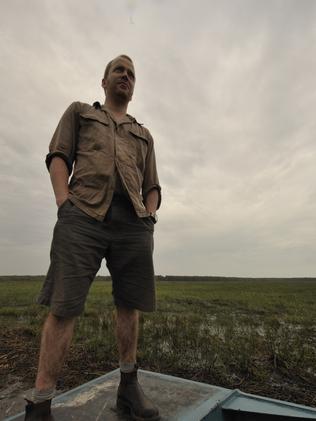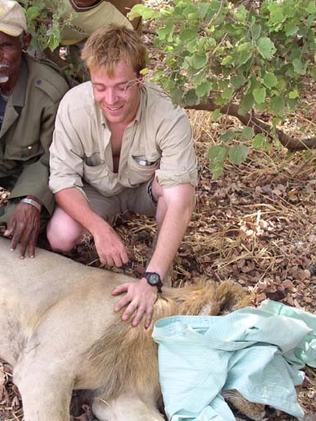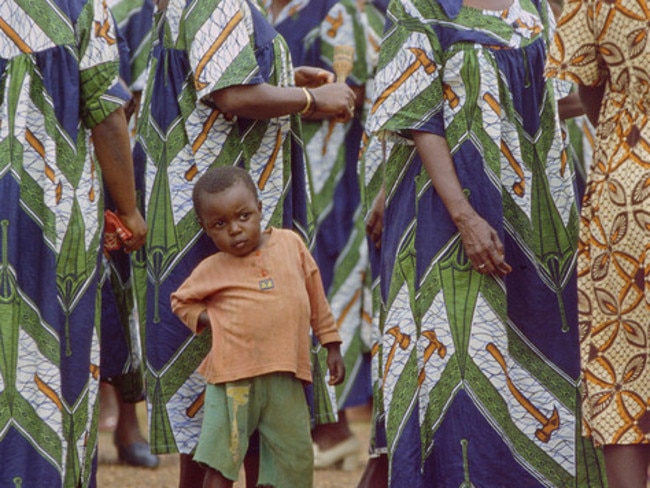Brain malaria in west Africa: One of the nastiest travel diseases you can catch
JUST before he passed out, Stephen was able to ask the doctor for a blood test. And this Aussie resident is very lucky to be alive.

IT WAS meant to be a fun night out to celebrate my partner’s return from west Africa. But what started out as a joyful occasion quickly turned into a frightening experience. In retrospect, I realise he’s lucky to be alive after being struck down by malaria, a mosquito-borne infectious disease that can be fatal.
He’d returned that day from his work as a wildlife ecologist in Cameroon to where I was staying in Bristol and to mark the occasion we decided to go to the pub for a drink.
After a couple of beers we caught a taxi back home and while in the cab he thought he’d have a lie down. By the time we arrived at the house where I was staying he discovered he didn’t have the energy to walk.
“How many drinks did he have?” the taxi driver asked, as I tried to pull him out of the car onto the pavement. We had a hunch at that stage that it couldn’t have just been the beers and jet lag.
With some newly found strength, I managed to half carry him up the stairs, through the front door, down the hall and into the shower. We thought some cold water might bring his fever down.

In general, malaria is a curable disease if diagnosed and treated promptly and correctly. It occurs in more than 100 countries — large areas of Africa and South and Southeast Asia and parts of Central and South America, the Caribbean, the Middle East and Oceania.
It was a terrifying situation but fortunately (or unfortunately) he’d had malaria before and suspected he might have contracted it again.
Stephen sat on the floor of the shower and while extremely listless managed to communicate that there was medication called mefloquine in his first aid kit. I ran to grab it.
Thankfully, after several hours he made a full recovery.


This scary episode was a huge contrast to the first time he contracted the disease and ended up having to be treated in hospital.
He told me how lucky he was to survive his first malaria attack, which occurred 10 years prior when he was working as a student on a research project in a national park in Cameroon.
At the time he was living in a mud hut and would walk 20km a day in the bush along transects to study wildlife.
Although he slept under a mosquito net and took malaria prophylaxis as a precaution, he still got brain malaria.
He remembers getting back from a day of field work and just feeling a bit queasy; bit of a headache and just sore muscles. He didn’t think much of it as he was taking malaria preventive medication. But to be on the safe side he took his temperature.
When he first took it he had a temperature of 37.5 degrees Celsius so he thought that was okay — it was 45 degrees Celsius outside so he expected to be a bit hot. But over the following two hours his fever shot up to 40.5 and his headache and feeling of disorientation got worse.
He realised he had to get to a medical facility quickly but was about 30km away from the nearest main road. After he managed to arrange a lift with a local villager to the main road, he hitchhiked to Garoua, the capital of the north region of Cameroon.
“I ended up at the hospital where I still had the lucidity to ask for a blood test. Turned out to be cerebral malaria and I got additional medication at which point I collapsed.
“Only thing I remember is waking up two days later feeling a lot better.”
So the moral of the story is — if you’re going off on an adventure be prepared, get your vaccinations and / or medications for whatever diseases are in the area you’re travelling to, and always carry a good first aid kit.



Here are some of the other nasty travel diseases you can catch around the world:
RABIES
The first time I’d heard of rabies was when as a kid I watched Cujo, a film based on Stephen King’s novel of the same name. It frightened me to the core.
This disease is caused by a virus and it is almost always fatal. The virus causes massive inflammation, or swelling, of the brain, and it’s most often transmitted by bites from infected animals.
Most of the estimated 55,000 human rabies deaths per year occur in Africa and Asia. For those planning a visit to a country or area at risk make sure you get your rabies vaccine before you head off.
TYPHOID
Typhoid is an infection that causes severe intestinal irritation. It kills something like 160,000 people every year and can take months to beat.
The method of infection isn’t pretty either — you get it from poo. So if someone who is shedding the bacterium Salmonella Typhi in their faeces prepares your food and they haven’t properly washed their hands you could get typhoid fever. Another way you could catch it is if it gets into the water supply that you use for drinking or to wash your food or clean your teeth.
The infections may occur anywhere in the world, but are more common in places with unsafe water supplies and poor sanitation, such as India, Pakistan and Bangladesh, most countries of Southeast Asia, several countries of the South Pacific, including Papua New Guinea, Central and South America, the Caribbean, African countries and countries of the Middle East.
JAPANESE ENCEPHALITIS
In March this year a Melbourne man contracted this rare viral brain condition in Bali, prompting calls from Victoria’s Chief Health Officer for travellers to get vaccinated before going overseas.
Japanese encephalitis is a mosquito borne viral disease prevalent in rural areas of Asia and Indonesia. While the majority of infections are mild, one in 250 infections result in high fever, headache, neck stiffness, disorientation, coma, seizures, spastic paralysis and even death.
For more information on taking care of your health while travelling visit smarttraveller.gov.au.
Continue the conversation on Twitter @newscomauHQ | @LeahMcLennan
leah.mclennan@news.com.au




